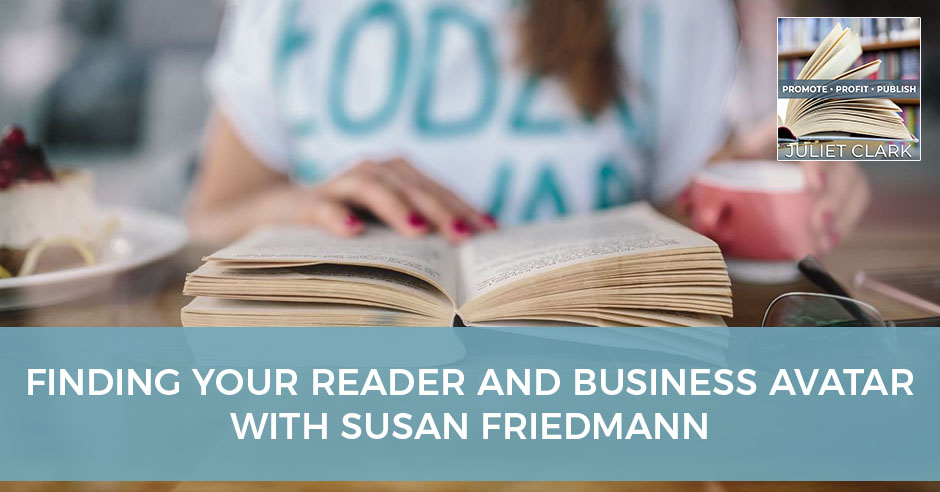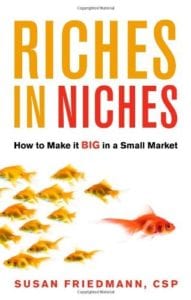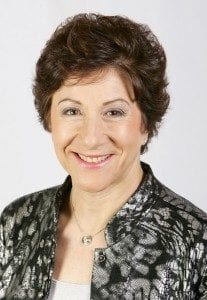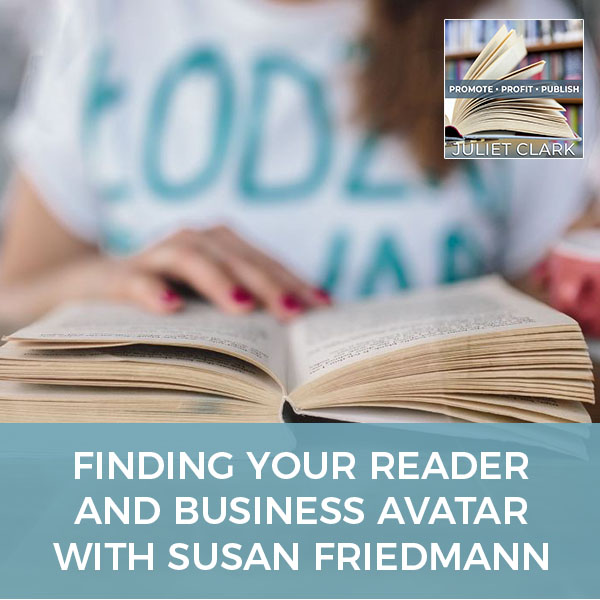
Niching down and building your business is very important for an author who wants to stand out in the crowd. There are thousands of titles that are coming onto the market every single month and it’s easy just to drown in that ocean of titles. The more that you can target a particular audience with your message, the easier it is for you to be noticed and be seen as an expert in that environment. Niche marketing expert and how-to coach Susan Friedmann works with authors and helps them get to be recognized as an expert in their field. Susan is the owner of Aviva Publishing. She has dedicated herself to working with self-published and nonfiction authors to bring their books to market and find the right target audience to deliver their message. Susan also hosts the very successful weekly podcast, Book Marketing Mentors.
—
Watch the episode here:
Listen to the podcast here:
Finding Your Reader and Business Avatar with Susan Friedmann

Riches in Niches: How to Make It Big in a Small Market
I am so excited to have a fabulous guest. I have Susan Friedmann who is an internationally recognized niche marketing expert and how-to coach. She is a prolific author, having written fourteen books including her bestsellers, Meeting & Event Planning For Dummies and Riches in Niches: How to Make It BIG in a Small Market. She’s appeared on a variety of radio talk shows and as a guest expert on CNN financial network and Bloomberg Small Business. She’s the owner of Aviva Publishing and dedicated herself to working with self-published and nonfiction authors to bring their books to market and find the right target audience to deliver their message. Susan also hosts the very successful weekly podcast on Book Marketing Mentors, which I was just a part of too. Welcome, Susan. I’m excited to have you.
Thank you, Juliet. It’s wonderful to be here.
I’m excited to have you because I don’t think that people realize that before they ever start their book journey, they really need to know what their niche is and what their message is. You probably see this too being a publisher, is that people come in when you talk to them and you say, “Who is your target audience?” They say, “Everyone, everybody.” They don’t understand the nuances of niching. Can you tell us a little bit about that?
The importance of niching is finding the right audience for your message. People get a bit confused by that word. They don’t really know how to pronounce it. It’s a French word. It means a corner. What you’re doing is you’re finding a corner in the marketplace that you can own, or at least that there’s fewer competition in that arena. It’s important for an author who wants to stand out in the crowd. You know as well as I that there are thousands of titles that are coming onto the market every single month and it’s easy just to drown in that ocean of titles. The more that you can target a particular audience with your message, the easier it is for you to be noticed and be seen as an expert in that environment. That’s what I like to work with my authors on is getting them to be recognized as an expert in their field.
For those of you who are not really grasping how down you need to get on this or how finite you need to get on this, I did a study one time for one of my authors who had a divorce book. She was insistent that we put it into divorce because she handled every category. The reality was that if you search for divorce books on Amazon, there are over 22,000 books. The likelihood of yours being up at the top is pretty slim to none. However, if you are able to niche down into let’s say I helped divorce couples with children or a toddler to three or teenagers, those are entirely different groups of people. If you put in that you help toddlers, there are only about 70 books. That’s the importance of moving and deciding where you’re going to be in that marketplace and niching down on a particular area that you will be going.
It’s interesting you should talk about the divorce because my girlfriend started a blog, which has turned into multiple books on dating after 40. Her husband after twenty years decided to leave her and then she’s left. She’s over 40 and it’s a whole different scene going out and trying to date. That’s a very lucrative niche out there. I had an author who’s specialized in the heating and air conditioning environment. A sales book in that environment is going to go a lot further than just saying, “I’ve got a book on sales.” There are hundreds of thousands of sales titles out there. Thank you for defining that even better.
It’s not just that, but most of the people who write books are entrepreneurs. They often come to us with their platforms wondering, “Why am I not connecting with an audience?” Most of the time, it’s because you’re not specialized enough. People aren’t aware of those special things that you bring to a market because your market is so broad. To me the $100 million question is, “What’s the biggest challenge and obstacle for authors committing to a niche market?” It’s so hard to get people to commit.
Niching is important for whoever wants to stand out in the crowd. Share on XI get this almost every day when I speak to authors. You ask them who their target is and it’s everyone or it’s a group of people here. I was on the phone with one of my authors and she’s written a book on depression. She said, “It’s good for therapists, school counselors and for superintendents and I want to speak to this group and that group,” and then, “By the way, I can get it over here.” I was like, “We have got to just channel this so that you can get your message out to the right people rather than be all over the place.” That’s so easy and it takes so much energy to do that, really understanding. It’s just an education of realizing that it’s okay to commit to one.
The fear is, “That means I can’t sell to anybody else. What if somebody in another industry wants to buy my book?” That’s all right. You can sell it to them. It doesn’t mean you have to put your energy into that market because you sold two books to somebody in a completely different marketplace. Between what you do and I do, Juliet, the education is so critical for authors to realize how important it is to find the right audience. I think the other part to this too is the message. It’s honing down what is their message. I had another author who is going to give her first talk to a women’s group. I said, “List out your benefits, your features, what do you want to say? What is your message and what does that mean? What are the benefits to that?” She wrote out things like, “I’m going to share my story about my struggles.” I was like, “That’s adjunct to the message, the point that you want to make.” Narrowing it down in terms of the message and the different points that you want to make and what that means to your target audience is critical.
That’s where a lot of authors miss it is they get into their story and their process without shining the light on how that alone doesn’t help others. People want the steps that are from the heart and the processes from the head.
It’s like, “What’s in it for me? What am I going to get out of this?” Every time I have a conversation with someone, I say, “You’re calling up because it’s what’s in it for you. You want to know what I can give you.” In the same way, your target audience wants to know what you can give them because that’s what’s going to endear you to them to buy your book, to buy your programs, your workshops and your coaching, whatever you want to sell and that’s what’s important.
There were a lot of benefits to niching down and one of them from the marketing standpoint is it’s expensive to market to everyone. That’s why a niche is so important. You can go broke marketing to that everyone group. What are some of the other benefits?

Business Avatar: Your target audience wants to know what you can give them because that’s what’s going to endear you to them, and that’s what’s important.
That’s probably one of the most important ones is understanding the efficiency of marketing because it can get very expensive and there are only so many things that you can do on a shoestring or a zero budget. You’ve got to be prepared to invest in some marketing. To do it more efficiently and more effectively you can do it when you’re channeling to one particular market. That’s going to make it so much easier. The other benefit too is it’s much more profitable. You’ve got fewer competitors in the marketplace so you’re no longer a generalist but you’re a specialist. You have to think and take that let’s say into the medical profession. Look at the difference in terms of profitability of what a specialist surgeon makes versus the generalists’ internists make.
A pediatric cardiologist is going to make far more because he’s so specialized than a general surgeon. In the same way, an author is going to be paid more for their speaking if they specialized in a particular niche or a special marketplace. It’s far more profitable. The more specialized, the higher your fee. There’s nobody else in the marketplace doing what you do, so if somebody wants what you do, you can write your own ticket for that.
Another part of that though is the messaging because I know for the longest time, people didn’t understand what I did. They had no idea what platform building was and how it was different than marketing. That message is important too.
My first career was working in the trade show arena and I became a specialist and expert in that arena. There was anybody else out there who was published. I stood out from the crowd with my message and I branded myself as the trade show coach. That name alone says what I do and that’s important. In fact, that’s one of my strategies in my Riches in Niches book. The first strategy is to choose a name that says what you do. I started off my life with a name. I was getting really fancy. I called myself Diadem Communications. It’s like, “What does that mean?” People thought I was in the wireless business. Once I said I was the trade show coach, there’s no if, ands or buts. People know exactly what I’m doing. I’m a coach in the trade show industry. Get away from the fancy and the cutesy. Tell people what you do. Don’t be afraid of that.
We have a saying in our ad agency, don’t get creative if you’re not creative.
It’s so critical for authors to realize how important it is to find the right audience. Share on XI was just getting far too fancy and the whole idea of a diatom, most people don’t even know what a diadem is but it’s a sign of distinction. It’s what the Romans used to wear. The laurel wreaths or a crown is called the diadem. That’s what we went for but nobody knew what that was. Until I started using it, I didn’t even know either.
I have to tell you when I named Winsome, I used it to describe my personality and I didn’t know what it was either. I took out the thesaurus and looked at what I thought the best fit was. Somebody who was branding came right up to me and said, “That’s a horrible name. You have no idea what you’re doing.” It happens.
Aviva happens to be my middle name. It means spring. I got us logo a little spring that comes but it just also happens that there’s a huge insurance company called Aviva as well. I have absolutely nothing to do with them, but I wouldn’t mind some of their money.
What is the optimum number of niches that you would recommend for anyone?
Start with one. The maximum is you really have to go with two. That means you’re splitting your energy in two. You’ve only got X amount of energy and X amount of dollars that you’re going to invest in your marketing. Why not hone in on that one market? I’m sounding like a stuck record but it is so important because it affects your marketing and everything you do, and you put all your energy. One of the biggest mistakes I made when I was in the trade show industry was I started going elsewhere. As soon as I did, I lost my focus. I was like, “Susan, go back to your roots. Go back to what you know, where you’re considered an expert and maximize that and forget about missing out somewhere else.”

Business Avatar: If somebody doesn’t relate to you, if they don’t feel that you’re interested in them and how they can succeed, they’re going to go elsewhere.
It’s hard. It takes focus and it takes dedication. If they go in the divorce market for a certain community, they can look at the blogs, they can look at the websites. They can look at companies that are also interested in that same target audience. There are speaking opportunities, usually associations who are looking for speakers. You’re going to get rich speaking than you are at selling books and we’ve had this conversation. It’s like, “You’re not going to get rich selling books.”
I want to get into something here because I want people to understand how important when you’re putting your niche together, how building an avatar helps with that too. Not just at identifying your target market but knowing their demographics, their behaviors and you know where they hang out. One of the things I hear a lot is, “I have a niche. It’s Jack Canfield. My audience is Jack Canfield.” You wouldn’t believe how many times a year I hear that my audience is Jack Canfield’s audience, but your audience isn’t Jack Canfield’s audience because you’re not Jack Canfield. How important do you think is it to build that client avatar and be precise and just know that’s a particular age group, these are the behaviors these people have and this is what they want?
It’s critical. You have to know everything about this avatar. It’s like, “What do they like to have for breakfast in the morning? What keeps them up at night? What are they frightened of? What do they like to do?” More often than not, the authors have written a book about themselves because it’s often their story. Chances are that they’re talking to somebody just like themselves and it makes it so much easier to identify that person. Is it a male? Is it a female? Are they married? Do they have kids? Are they empty nesters? Are they going into a second career? Did they have a divorce? They had a tragedy. They got over an addiction. It’s usually the same crowd, a person like yourself because you’ve been motivated and inspired to write this book. It’s often your story that has brought you to write that book.
From the marketing aspect, we are moving more and more into the marketing being the consumer experience and everything being experiential, so that’s yet another reason. You have to know when your marketing and how you can provide the best consumer experience not only for your books but your products and services as well. Behaviors are becoming a bigger, more critical factor.
I’m hearing this more and more. They call it neuromarketing I believe it. It’s just getting into the brain and how your avatar, your target, how are they thinking, what do they feel? There’s just so much out there. If somebody doesn’t relate to you, if they don’t feel that you’re interested in them and how they can succeed, they’re going to go elsewhere. They have to feel that you are interested in them and that you want to see them succeed. I know this is one of the reasons that you do this. I do my podcast, the Book Marketing Mentors because we’re giving such incredible tips and techniques to people who are hungry. People are hungry for information.
You have a giveaway for us. By the way, not only is Susan giving this away, she is a part of our platform building tips and tricks community. If you have questions, she’s in there and she can respond to your questions as well. Tell us what you have for us.
First of all, I’ve got two things that I thought might be useful. Actually, I’m going to make it three. I’m going to be generous. One is ten questions to find your niche or your niche market. These are ten very distinct questions that you need to be asking to identify that marketplace for yourself. Then I’ve also put together 112 profitable author marketing income streams. Those authors out there who want to know how they can make money as well from their book and other ways in which they can make money that should be interesting. Finally, I’d love to give all of your audience a PDF copy of the Riches in Niches book. I will put that together as a zip file and if they email me at Susan@AvivaPubs.com. Tell me that you read Juliet’s blog and I will be more than happy to send that to you. If you would like a fifteen-minute introductory consultation with me, you can do that as well. I’ll send you a link to sign up for that.
Susan, we love having you on the show.
Thanks for the opportunity. It’s been a pleasure.
Important Links:
- Meeting & Event Planning For Dummies
- Riches in Niches: How to Make It BIG in a Small Market
- Aviva Publishing
- Book Marketing Mentors
- Susan@AvivaPubs.com
About Susan Friedmann
 In 1992 I founded Aviva Publishing as a way to publish my own books. Since my topic was targeted to a very specific niche market, traditional publishers weren’t interested in taking the chance to publish my books. So I decided to do it for myself, and to date, I’ve published ten of my own books. (I also have four books published by traditional publishers.)
In 1992 I founded Aviva Publishing as a way to publish my own books. Since my topic was targeted to a very specific niche market, traditional publishers weren’t interested in taking the chance to publish my books. So I decided to do it for myself, and to date, I’ve published ten of my own books. (I also have four books published by traditional publishers.)
Over the years, with the help of some very special people, namely, book writing coach, Patrick Snow, ghost writers, Tim Polk, and Toni Robino, Aviva Publishing has grown exponentially.
For over 20 years now we have helped over 250 authors with their publishing needs.
In the book publishing industry, Aviva Publishing, is known as a “vanity publisher.” This means that we publish books at the author’s expense, and the author holds 100 percent of the “rights” and profit to their book.
Once a book is written, the journey has only just begun. Because, there are still many steps involved in bringing the book to market, our job is to help make that process as easy, simple, and painless as possible for you, the author.
Love the show? Subscribe, rate, review, and share!









Leave A Comment